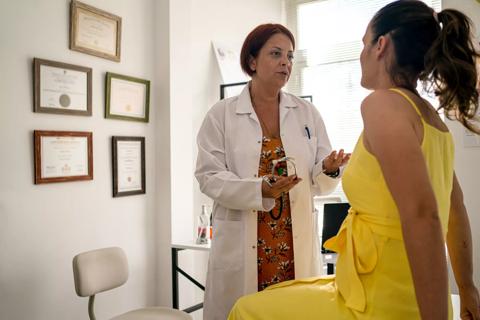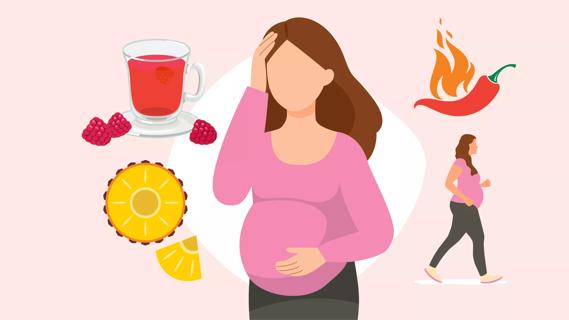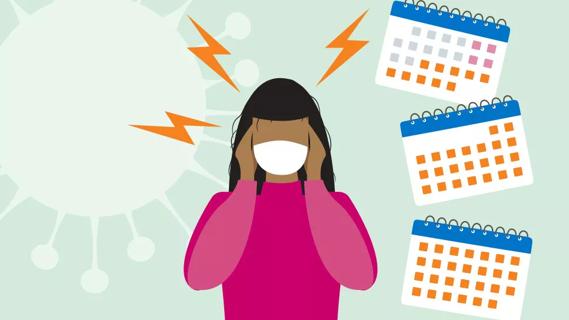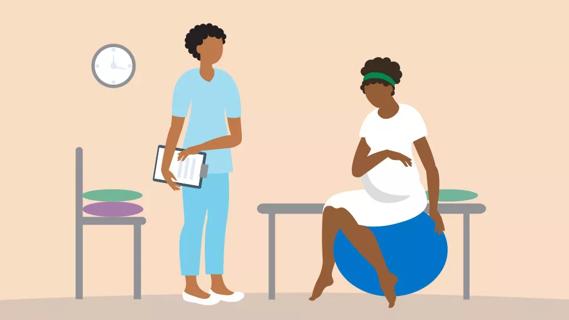Learn more about the risks and how healthcare providers are working even harder to keep mothers safe

Mothers want what’s best for their children — even before they make their way into the world.
Cleveland Clinic is a non-profit academic medical center. Advertising on our site helps support our mission. We do not endorse non-Cleveland Clinic products or services. Policy
From finding a trusted obstetrician to tracking down a specific nursing pillow pattern, expectant mothers will go above and beyond to make sure their children’s arrivals go according to plan.
But as we all know, life has a way of throwing wrenches into plans.
Pregnancy is already a journey filled with excitement, a little uncertainty and a lot of questions. However, the coronavirus (COVID-19) is turning things upside down for pregnant people across the country.
On top of the regular concerns that pop up during this time, pregnant people now have to contend with the realities of this new normal — arriving at appointments and ultrasounds only to be told that their spouses must wait outside, or being extra cautious so they don’t put themselves and possibly their future children at risk. And the accounts of people being told that they’ll have to face the delivery room alone or won’t be able to see their babies for days are just heartbreaking.
When you’ve spent a lot of time formulating the ideal birth plan, deviating from it can be really tough, especially if you’re a new mom. Having a baby at home seems to be an appealing option for pregnant people who don’t want to face the uncertainties that come along with having a baby during a pandemic. But home births aren’t just about birthing pools, candles and being surrounded by loved ones. There are some risks that come along with them as well.
“In the United States, about 0.9% of births take place in the home,” says maternal-fetal medicine specialist Edward Chien, MD, MBA, Chairman of the Department of Obstetrics and Gynecology. (That’s approximately 35,000 births each year.) “It’s important that people are presented with the potential risks and benefits related to this choice.”
While home births seem to symbolize comfort and safety for expectant mothers, there can be a downside to them.
Dr. Chien says studies have shown that the risks for perinatal deaths are twice as high for home births in comparison to hospital births. The chances of either neonatal seizures or serious neurological dysfunctions are three times as high in a home birth setting than they are in a hospital setting. Postpartum hemorrhaging is another associated risk of the home birth process.
Another thing mothers face — the fact that not all home birth providers are properly certified.
“For example, in Ohio, lay midwives or home birth attendants are unregulated. If a patient is considering a home birth, it’s important that they seek a certified nurse-midwife with a clearly defined transfer arrangement or general agreement with a healthcare provider,” Dr. Chien says.
Now, we’re not telling you this to scare you. There are plenty of qualified certified-nurse midwives and certified-midwives who are committed to providing skilled, comprehensive care during these challenging times. But Dr. Chien strongly suggests giving birth in a hospital because, in the event that there are complications, hospitals are better equipped to handle emergencies.
“There are some healthcare providers that have formal relationships with nurse-midwives. And these nurse-midwives have structured transport processes in place for performing home births. If a patient chooses to work with one, this of all things would probably be the safest arrangement,” says Dr. Chien.
Hearing the accounts of others and experiencing abrupt changes in your healthcare routine might have you feeling very worried about what your delivery day will bring. If you’re unsure, don’t speculate. Instead, talk to your doctor and let them know how you’re feeling. They can walk you through the process and answer any questions you have.
“It’s clear that in some regions the COVID-19 outbreak is much more severe than in others at this point in time. In those centers or areas where the common spread is higher or the symptomatic infection rate is significantly higher, medical facilities have adjusted the way they provide care primarily for patient safety,” says Dr. Chien. This explains the numerous protocols being put into place. While some may seem extreme, keep in mind that they were created to keep you and your baby safe.
“We are preparing for the COVID-19 surge and have plans in place to provide a safe environment for our mothers,” Dr. Chien explains. “As physicians, we encourage our patients to express their concerns and ask their questions so that we can reassure them that we are providing a safe environment for labor.”
Preventive measures that are currently being taken at Cleveland Clinic include:
And once your baby is born, you’ll still get the same level of care, attention and support that you could before the pandemic started — taking any uncertainty out of the equation.
“We are encouraging discharge when the new mother and baby are medically stable. We also have support services for breastfeeding that can be obtained as an outpatient,” says Dr. Chien.
“We stopped group support services when the COVID-19 outbreak began, but still offer one-on-one individual and virtual visits for breastfeeding moms who need additional support.”
Learn more about our editorial process.

Staying up-to-date on vaccines encourages a healthy pregnancy, but not all vaccines are recommended when you’re pregnant

Science says only one way actually works, but there are a few others that are still safe to try

COVID-19 may be associated with tinnitus, but research is still ongoing

When a growing fetus puts pressure on your abdomen, your belly button may pop out or even flatten

The short answer: It’s complicated, but the basic care precautions still prevail, like washing your hands and isolating if you’re sick

They can feel like a typical headache or a migraine headache, but the pain can last for weeks to months

One is a trained care professional, while the other is a medical caregiver, but both can be important parts of your birthing team

Any large social gathering — from a family birthday party to an indoor music concert — has the potential to spread serious infection

Your metabolism may torch 1,300 to 2,000 calories daily with no activity

A gentle touch in all the right places may help drain your sinuses